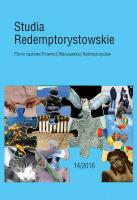Amoris laetitia. “Accompagnare, discernere ed integrare la fragilita”
Amoris laetitia. Accompany, discern and integrate fragility
Author(s): Andrzej KukłaSubject(s): Christian Theology and Religion, Family and social welfare, Canon Law / Church Law
Published by: Warszawska Prowincja Redemptorystów
Keywords: Amoris laetitia; sacramental Holy Communion for remarried; discern; accompany to remarried; integrate fragility; non-sacramental couples; catholic family;
Summary/Abstract: The appearance of Amoris laetitia of Pope Francis brought with it a new dimension of discussion on the shape of Catholic families. The reactions of the commentators of this exhortation are extreme, from admiration of the novelty of the papal teaching to the harsh criticism of the violation of the teaching of the Catholic Church. The discussion has, to a large extent, focused on the issue of one footnote referring to the possibility of receiving sacramental Holy Communion by people previously connected with a sacramental marriage and now living in a new relationship with another person. Very important for understanding the message of Amoris laetitia is the theological search aimed at finding this subtle boundary between the subjective consciousness of sin in a particular person and the objective law in force in the Church. In the preparatory work for the Second Vatican Council and later attempts were made to see this problem and to remedy it in the most appropriate way. One of the precursors of solutions included by Pope Francis in the Amoris laetitia was the late moralist, Fr Bernard Häring, C.Ss.R. It was he, exposing himself to the Vatican institutions, who boldly asked and offered to help those suffering a dilemma or even a tragedy in experiencing a sacramental marriage. The problem of going out to people hurt in the Church and accompanying them in experiencing difficult turns in life, has always been and will always be the task of the Church in its wide spectrum of ministries. The Amoris laetitia exhortation has reopened the theological mechanisms and tendencies that were already present in the Church, but they could not always break through. One cannot ignore the fact that Amoris laetitia in some sense has opened the theological Pandora’s box, which provoked some to overly bold and far-reaching conclusions and decisions. Certainly the content included in this papal document must be interpreted without unnecessary emotions, but with great prudence and theological responsibility for the whole Church. There is always the danger of too far-reaching solutions that may later lead to irreversible theological and pastoral processes.
Journal: Studia Redemptorystowskie
- Issue Year: 2018
- Issue No: 16
- Page Range: 349-368
- Page Count: 20
- Language: Italian

